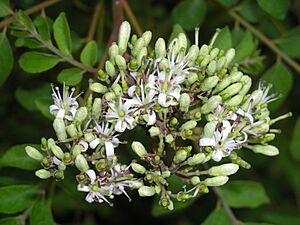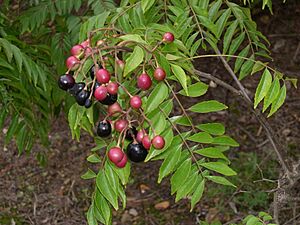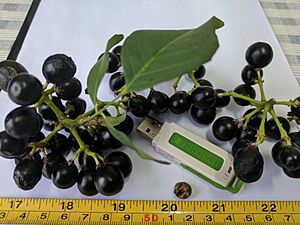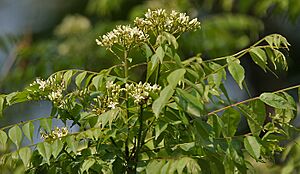Curry Tree facts for kids
Quick facts for kids Curry Tree |
|
|---|---|
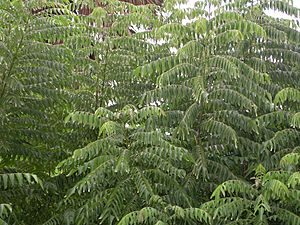 |
|
| Scientific classification | |
| Kingdom: | |
| (unranked): | |
| (unranked): | |
| (unranked): | |
| Order: | |
| Family: | |
| Genus: |
Murraya
|
| Species: |
M. koenigii
|
| Binomial name | |
| Murraya koenigii (L.) Sprengel
|
|
The curry tree (Murraya koenigii) is a special plant. It is a tree that grows in warm, tropical places. You can find it naturally in India and Sri Lanka.
This tree is part of the Rutaceae family. This family also includes plants like citrus trees. Its leaves are very famous. They are used in many dishes in India, Sri Lanka, and nearby countries. People often call them 'curry leaves'. This is because they are used a lot in curries. In many Indian languages, they are also called 'sweet neem leaves'. This is different from regular neem leaves, which are very bitter.
Contents
What the Curry Tree Looks Like
The curry tree is a small tree. It usually grows about 4 to 6 meters (13 to 20 feet) tall. Its main stem, called the trunk, can be up to 40 centimeters (16 inches) wide.
Leaves, Flowers, and Fruits
The leaves of the curry tree smell very nice. They are made up of smaller leaflets. Each leaf has between 11 and 21 leaflets. Each leaflet is about 2 to 4 centimeters (0.8 to 1.6 inches) long. They are also about 1 to 2 centimeters (0.4 to 0.8 inches) wide.
The tree produces small, white flowers. These flowers have a lovely smell. They can pollinate themselves. After the flowers, small, shiny-black berries grow. Each berry has one large seed inside. You can eat the pulp of the berry. It tastes sweet but also a bit like medicine. However, people usually do not use the berry pulp or the seed for cooking.
Naming the Tree
The scientific name for the curry tree is Murraya koenigii. The second part of the name, koenigii, honors a botanist named Johann Gerhard König. A botanist is a scientist who studies plants. The first part of the name, Murraya, honors a Swedish doctor and botanist named Johan Andreas Murray.
How We Use Curry Leaves
Curry leaves are very important for cooking. They are highly valued in southern and west-coast Indian cooking. They are also used a lot in Sri Lankan cooking. People often fry them with chopped onions at the start of a dish. This is especially true for curries.
Storing Curry Leaves
Fresh curry leaves do not last long. They do not stay fresh for long in the refrigerator. You can also find them dried. But dried leaves do not have as strong a smell. A good way to keep them fresh is to freeze them. Make sure they are wrapped well. If you live in a warm place, you can even grow your own curry tree at home!
Other Uses
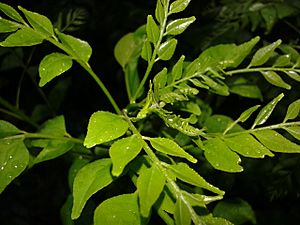
Besides curries, curry leaves can add flavor to many other dishes. For example, in Cambodia, people toast the leaves over a fire. They might also roast them until they are crispy. Then, they crush the leaves into a sour soup called Maju Krueng.
Curry leaves are also used in traditional Ayurvedic medicine. Some people believe they can help with diabetes.
Because of their special smell, curry leaves are used in many products. These include soaps, body lotions, and perfumes. They are also used in things like air fresheners, bath oils, and even hair treatments.
Growing a Curry Tree
If you want to plant a curry tree, you need fresh, ripe seeds. Seeds that are dry or shriveled will not grow. You can plant the whole fruit. But it is best to remove the soft pulp first. Then, plant the seed in potting soil. Keep the soil moist, but not too wet.
Images for kids
See also
 In Spanish: Árbol de Curry para niños
In Spanish: Árbol de Curry para niños
 | James B. Knighten |
 | Azellia White |
 | Willa Brown |


